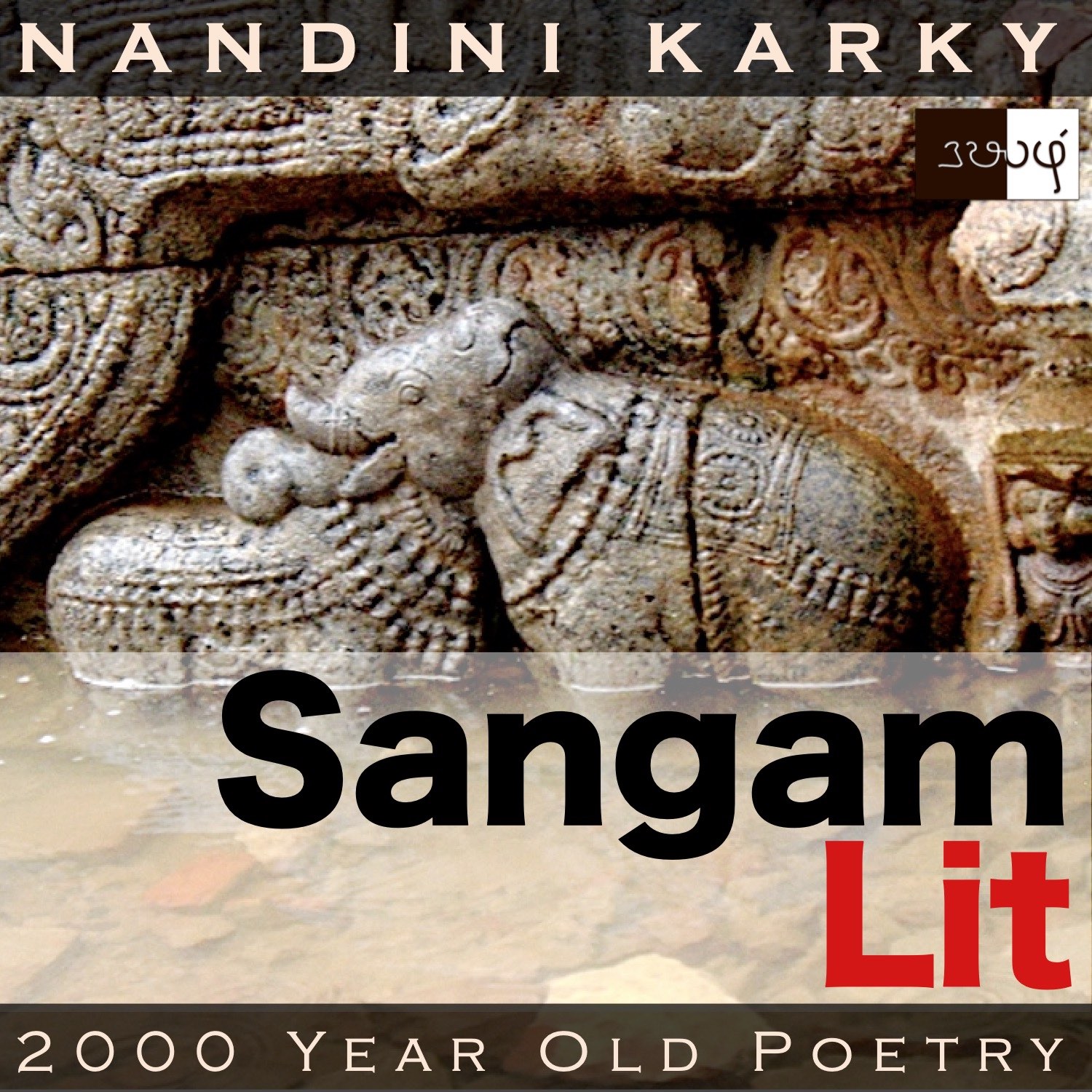Podcast: Play in new window | Download
Subscribe: Apple Podcasts | Spotify | Amazon Music | Android | iHeartRadio | Email | TuneIn | RSS | More

In this episode, we witness the fascinating world of Tamil Sangam Literary Work, Natrinai Poem 14, written by Mamoolanar, a historian-poet. This verse is set in the ‘Paalai’ or the dryland regions, in the words of the lady to the lady’s confidante about her man, who has parted away from her.
தொல் கவின் தொலைய, தோள் நலம்சாஅய,
நல்கார் நீத்தனர்ஆயினும், நல்குவர்;
நட்டனர், வாழி!-தோழி! குட்டுவன்
அகப்பா அழிய நூறி, செம்பியன்
பகல் தீ வேட்ட ஞாட்பினும் மிகப் பெரிது
அலர் எழச் சென்றனர் ஆயினும்-மலர் கவிழ்ந்து
மா மடல் அவிழ்ந்த காந்தள்அம் சாரல்,
இனம் சால் வயக் களிறு பாந்தட் பட்டென,
துஞ்சாத் துயரத்து அஞ்சு பிடிப் பூசல்
நெடு வரை விடரகத்து இயம்பும்
கடு மான் புல்லிய காடு இறந்தோரே.
At first glance, there are two distinct elements in this verse. One is the thunderous sound heard in ‘அஞ்சு பிடிப் பூசல்’, which is the bellowing of a female elephant in fear. And yet, this was not the only sound this poem presented, I understood, as I delved deeper. Sounds that you cannot ignore, form the first element in this verse. The next would be something internal, a feeling of positivity. This is reflected in the sense of ‘even though’ and ‘yet, he will’ stressed in the line ‘நல்கார் நீத்தனர்ஆயினும், நல்குவர்!’ With the very first impression, this verse conveys a feeling of strength, be it in the sensory perception of the elephant’s trumpet or in the internal feeling of the lady’s trust.
The sounds heard far off, across aeons of time, were brought close by, thanks to other ears that have listened and tried to understand. Through the reading of explanatory texts, I was able to sense the meaning and context of this verse as thus: The lady’s confidante comes to the lady with the news that the lady’s man has parted away and speaks negative words about his act. To that, the lady responds saying, ‘Dear friend, although my man has left me without showering me with his grace, causing my erstwhile beauty to fade and my shoulders to lose their charm, he will return! For he is kindness personified. May he live long! Yes, it’s true that he has left me in a state where all the village is in uproar with rumours about our relationship, louder than the cries that would have emanated when the Chola King Sembiyan set fire to ruin the town of Agappa, ruled by the Chera King Kuttuvan. And yet, as he roams the forests of the Kalvar king, Pulli, where the buds of the flame lily bend and blossom along the mountain slopes and there, a bull elephant is caught in the open mouth of a python and fearing for the life of its partner, the female elephant trumpets to the skies, the sound of which echo high up in those mountains, I know that he will return to me!’
Our historian-poet Mamoolanar disappoints not. This verse is a treasure trove of intricate information about those ancient lands, its rulers as well as its flora and fauna. Let’s relish all these fascinating facts stitched in multiple layers with poetic expertise. First, is the reference to Kuttuvan’s Agappa. I learnt that Kuttuvan is the name taken by the Chera Kings, who commences his rule from Kuttanaadu, which is current-day Kerala and specifically, the districts of Azhapuzha and Kottayam. Then, coming to the town of Agappa, this is said to be a town with a palace surrounded by a moat and a hanging gate. Note the reference to this fort with a ‘hanging gate’. We will visit it soon. Before that, let’s meet the Chola King Sembiyan, who through another Sangam poem, is believed to be ‘தூங்கெயில் எறிந்த தொடிதோட் செம்பியன்’(The Chola king who set fire to the fort with the hanging door’). This king is said to be the ancestor of Killivalavan, to whom the later Cholas trace their ancestory. Also, we find Pulli, the Kalvar king who is believed to be a ruler of Vengadam, a mountainous region, currently in the state of Andhra Pradesh and pointing specifically to the Tirupati hill. Moving on to the flora and fauna, we meet the flame-lily or the காந்தள் flower, which has fire-like petals, blooming on the mountain slope. It might have been brushed off as a casual reference to a flower that grows on the wayside, if not for the rhyming ‘பாந்தள்’ or a snake, most probably a python, that follows in the next line. I found a stunning link in reading that the flame lily is a poisonous flower and I believe it is with the scent of this poisonous nature, that the poet is leading us to the approaching snake in the succeeding line. Then, as promised, the reference to the hanging fort is linked to the hanging trunk of the bull elephant that’s attacked by the snake. Thus, many elements are interwoven in an exquisite and yet subtle fashion, in the lines of this verse.
Even though there are all these rich elements, each calling out in vibrant notes, it’s the core theme of the lady’s trust, that stays with us. It seems to say, ‘Things may not be how they should be. But I know it will change for I truly believe.’ It’s this whisper that echoes the loudest in the mountains of one’s mind.




Share your thoughts...